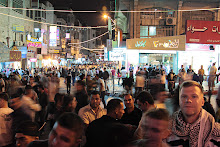The three chapters from Salim Tamari's Mountain against the Sea provide a brilliant counterpoint to top-down political narratives about the Israel/Palestine dispute. One of the primary weaknesses of the dominant political narrative is one of scale: the actors in the dispute are groups and their political leadership; Tamari's chapters re-introduce the individual as the site and the object of these larger geopolitical narratives. In other words, Tamari skillfully demonstrates the lived experiences of people who were the pawns of geopolitics, the very people who were most affected by the dispute, querying sources and individuals far removed from the circles of power, from the typical descriptions of Jerusalem before and after the 1948 war. What results is a very different picture of Israeli/Palestinian relations--indeed, a completely different topography of Jerusalem.
In chapter 5, "A Musician's Lot," Tamari lays out his fundamental departure from "conventional narratives" about Jerusalem. As history books tend to short-hand the city into the quarters (Jewish, Christian, Armenian, and Muslim), individual identities and lived experiences are subsumed into these "ethno-confessional divisions"--divisions that can be simply circumscribed and described in diagrams and neat paragraphs by historians, sociologists, etc.
Tamari complicates this through the writings of a Jerusalem musician from the early 20th century, and shows that the socio-cultural map of Jerusalem was far more complex, fluid, and hybrid than allowed for in conventional narratives. Identity itself is (and was) a fungible thing, and in Wasif Jawhariyyeh's narrative, individuals and groups with multiple identities shared the same spaces, creating not only a complex map of overlapping group identities, but a creolized culture that bridged differences.
Interestingly, in his brief biography of Jawhariyyeh, Tamari illustrates many of the problems of conventional narratives: Jawhariyyeh's life story was complex and irreducible to a single sentence--even the parts before his music career. If one individual's life is so deep and rich, imagine the injustice done when entire communities are so treated, reduced to a single sentence in a footnote of a 400-page history book.
But then, one of Tamari's points is that the division of the city into four "confessional" quarters was a retroactive reduction by the British during the Mandate, and this fits well with how we see imperial/colonial re-writings of history and geography. There is a deep need to simplify and create realities that correspond to (and support) colonial mappings of conquered/administered territory--and colonial imaginations of the homeland and the roles of its people. In other words, the British simplified the geography and history of Jerusalem in order to administer it, to "create" a new past that fit the present (at the time) geography and history, and to reify their roles as administrators of the Mandate.
I could say a lot more about chapter 5, but rather than spend too much time on this one chapter, I'll skip ahead to chapter 6, "Lepers, Lunatics and Saints." In this chapter, Tamari discusses the (interwar) ethnographic writings of Tawfiq Canaan, a Jerusalem physician.
One of the most brilliant points Tamari makes is how "the process of ethnic exclusion and demonization had sunk" to the point that Arab and Jewish lepers were segregated after the war of 1948--even members of a group typically shunned by society were subject to, and objects of, the divisions caused by the territorial dispute-cum-war. Leprosy's provenance is given little thought anymore, despite the religious connotations of the disease and thus its role in the religious histories of the region--because Canaan was so very successful at helping eradicate the disease from the region.
But the contribution that Tamari makes with this chapter that I think is most important to our perceptions and study of disputed Jerusalem is his discussion of nativism and how Canaan and his contemporaries in the Journal of the Palestine Oriental Society anticipated and to some degree presaged Said's notion of Orientalism and the reductions and violences Orientalism entails. Tamari seems to indicate that Canaan and his circle valorized the peasantry to no small degree, but despite this problematic elevation of the peasant as the repository of culture and history, Tamari sees Canaan's work as ethnography unsullied by later folklore revivalism--a revivalism that was both insincere and inaccurate in its representation of Palestinian life.
Tamari points out that revivalism--and, by extension, the Orientalist-tainted histories and geographies of the region--was a reaction to Zionist history, and thus surrendered authenticity and representation to Zionist claims. Thus, Tamari sees Canaan's writings as being descriptive of quotidian Palestinian life, rather than a reactive movement that simply argued with counter-histories about "who was here first," or "whose culture is most authentic to the region."
To wrap up (prematurely) what has turned into a very labyrinthine meta-discussion of the readings within the readings, I'll just touch on the ethnographic details of Tamari--details left out of histories like Armstrong's. For example, despite Armstrong's love for digging into the details of religious belief and practice, revelations like Canaan's detailing of the relationship between madness and demonic possession, the attachment of religious meaning to the darwish and the practices of djinn--these are little tidbits, samples of life during the interwar period that Armstrong skips over. And for good reason: Armstrong isn't interested in the peculiarities of religious belief among Palestinian peasants in the interwar period. By this time, Armstrong doesn't feel that the reader needs more details about Baal or local demons, etc., Armstrong has decided that the political climate of the interwar period is more important to relate than the substance and details of the lives of people.
And thus it is all too easy to lose sight of the fact that people were living, and continue to live, in this region, and their daily lives are subject to--but oddly, not relevant to--the political tides of the day.
Sunday, May 1, 2011
Subscribe to:
Post Comments (Atom)


No comments:
Post a Comment